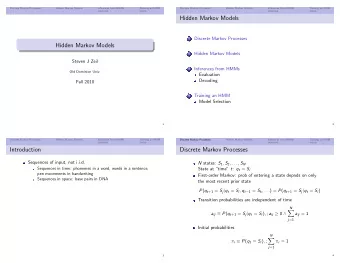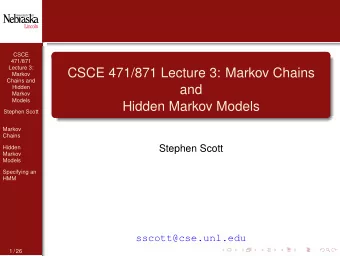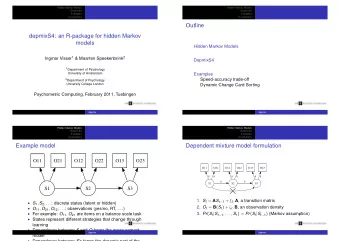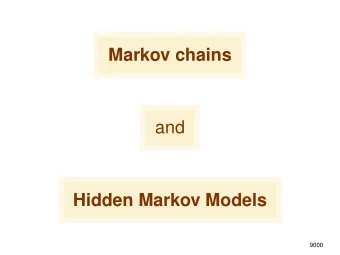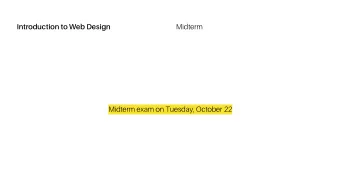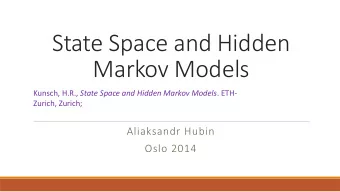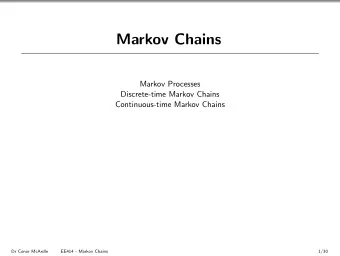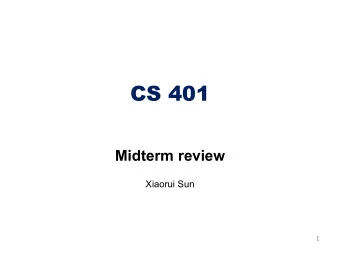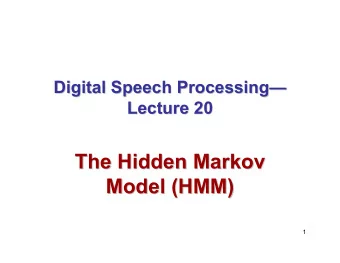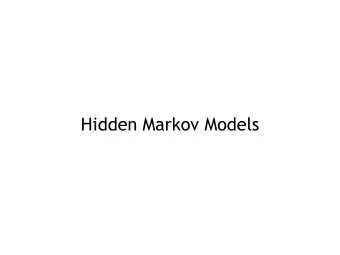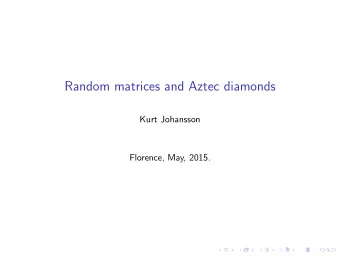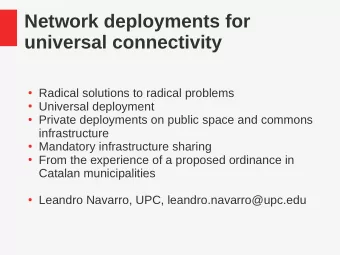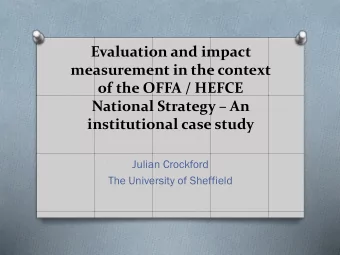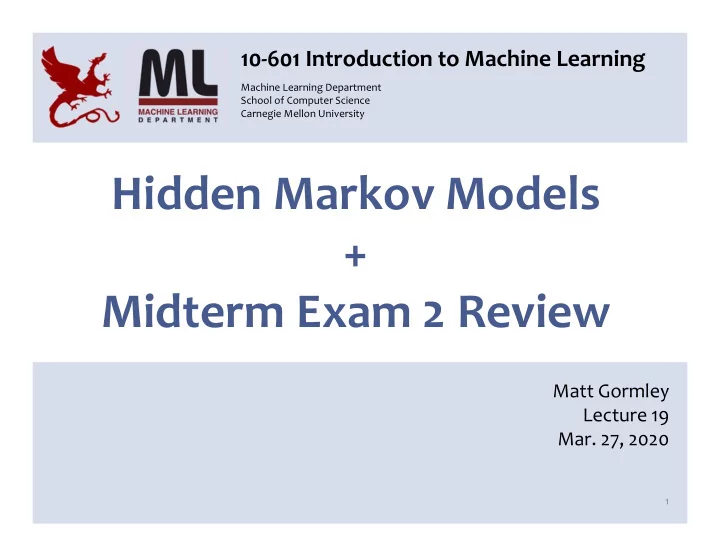
Hidden Markov Models + Midterm Exam 2 Review Matt Gormley - PowerPoint PPT Presentation
10 601 Introduction to Machine Learning Machine Learning Department School of Computer Science Carnegie Mellon University Hidden Markov Models + Midterm Exam 2 Review Matt
10 � 601 � Introduction � to � Machine � Learning Machine � Learning � Department School � of � Computer � Science Carnegie � Mellon � University Hidden � Markov � Models + Midterm � Exam � 2 � Review Matt � Gormley Lecture � 19 Mar. � 27, � 2020 1
Reminders � Homework 6: � Learning Theory / � Generative Models � Out: � Fri, � Mar � 20 � Due: � Fri, � Mar � 27 � at � 11:59pm � Practice Problems for Exam 2 � Out: � Fri, � Mar � 20 � Midterm Exam 2 � Thu, � Apr 2 � – evening exam, � details announced on Piazza � Today’s In � Class Poll � http://poll.mlcourse.org 2
MIDTERM � EXAM � LOGISTICS 3
Midterm � Exam � Time � / � Location � Time: � Evening � Exam Thu, � Apr. � 2 � at � 6:00pm � – 9:00pm � Location : � We � will � contact � you � with � additional � details � about � how � to � join � the � appropriate � Zoom � meeting. � Seats: � There � will � be � assigned � Zoom � rooms . � Please � arrive � online � early. � � Please � watch � Piazza � carefully � for � announcements. � Logistics � Covered � material: � Lecture � 9 � – Lecture � 18 � (95%), � Lecture � 1 � – 8 � (5%) � Format � of � questions: � Multiple � choice � True � / � False � (with � justification) � Derivations � Short � answers � Interpreting � figures � Implementing � algorithms � on � paper � No � electronic � devices � You � are � allowed � to � bring one � 8½ � x � 11 � sheet � of � notes � (front � and � back) 4
Midterm � Exam � How � to � Prepare � Attend � the � midterm � review � lecture (right � now!) � Review � prior � year’s � exam � and � solutions (we’ll � post � them) � Review � this � year’s � homework � problems � Consider � whether � you � have � achieved � the � “learning � objectives” � for � each � lecture � / � section 5
Midterm � Exam � Advice � (for � during � the � exam) � Solve � the � easy � problems � first � (e.g. � multiple � choice � before � derivations) � if � a � problem � seems � extremely � complicated � you’re � likely � missing � something � Don’t � leave � any � answer � blank! � If � you � make � an � assumption, � write � it � down � If � you � look � at � a � question � and � don’t � know � the � answer: � we � probably � haven’t � told � you � the � answer � but � we’ve � told � you � enough � to � work � it � out � imagine � arguing � for � some � answer � and � see � if � you � like � it 6
Topics � for � Midterm � 1 � Foundations � Classification � Probability, � Linear � � Decision � Tree Algebra, � Geometry, � � KNN Calculus � Perceptron � Optimization � Regression � Important � Concepts � Linear � Regression � Overfitting � Experimental � Design 7
Topics � for � Midterm � 2 � Classification � Learning � Theory � Binary � Logistic � Regression � PAC � Learning � Multinomial � Logistic � � Generative � Models Regression � Generative � vs. � � Important � Concepts Discriminative � Stochastic � Gradient � � MLE � / � MAP Descent � Naïve � Bayes � Regularization � Feature � Engineering � Feature � Learning � Neural � Networks � Basic � NN � Architectures � Backpropagation 8
SAMPLE � QUESTIONS 9
Sample � Questions 10
Samples � Questions 11
Samples � Questions ��� ��� 12
Sample � Questions 13
Sample � Questions ��������������� ���������������������������������������������������������������������������������������� 14
Sample � Questions ��������������� ������������������������� �������������������� ������������������������������������������������� �������������������������� � �������������������� �������� �� ����������������������������� ����������������������������������������� 15
Sample � Questions 16
Sample � Questions 17
Sample � Questions 18
HIDDEN � MARKOV MODEL � (HMM) 19
HMM � Outline � Motivation � Time � Series � Data � Hidden � Markov � Model � (HMM) � Example: � Squirrel � Hill � Tunnel � Closures � [courtesy � of � Roni � Rosenfeld] � Background: � Markov � Models � From � Mixture � Model � to � HMM � History � of � HMMs � Higher � order � HMMs � Training � HMMs � (Supervised) � Likelihood � for � HMM � Maximum � Likelihood � Estimation � (MLE) � for � HMM � EM � for � HMM � (aka. � Baum � Welch � algorithm) � Forward � Backward � Algorithm � Three � Inference � Problems � for � HMM � Great � Ideas � in � ML: � Message � Passing � Example: � Forward � Backward � on � 3 � word � Sentence � Derivation � of � Forward � Algorithm � Forward � Backward � Algorithm � Viterbi � algorithm 20
Markov � Models Whiteboard � Example: � Tunnel � Closures � [courtesy � of � Roni � Rosenfeld] � First � order � Markov � assumption � Conditional � independence � assumptions 21
22
23
24
25
Totoro’s � Tunnel 26
27
Mixture � Model � for � Time � Series � Data We � could � treat � each � (tunnel � state, � travel � time) � pair � as � independent. � This � corresponds � to � a � Naïve � Bayes � model � with � a � single � feature � (travel � time). p � O, S, S, O, C, 2m, 3m, 18m, 9m, 27m ������ = ( .8 � * � .2 � * � .1 � * � .03 � * � … ) O .8 O .8 S .1 S .1 C .1 C .1 O S S O C 1min 2min 3min 1min 2min 3min … … 2m 3m 18m 9m 27m O .1 .2 .3 O .1 .2 .3 S .01 .02.03 S .01 .02.03 C 0 C 0 0 0 0 0 29
Hidden � Markov � Model A � Hidden � Markov � Model � (HMM) � provides � a � joint � distribution � over � the � the � tunnel � states � / � travel � times � with � an � assumption � of � dependence � between � adjacent � tunnel � states. p � O, S, S, O, C, 2m, 3m, 18m, 9m, 27m ���� = ( .8 � * � .08 � * � .2 � * � .7 � * � .03 � * � … ) O S C O S C O .8 O .9 .08.02 O .9 .08.02 S .1 S .2 .7 .1 S .2 .7 .1 C .1 C .9 0 .1 C .9 0 .1 O S S O C 1min 2min 3min 1min 2min 3min … … 2m 3m 18m 9m 27m O .1 .2 .3 O .1 .2 .3 S .01 .02.03 S .01 .02.03 C 0 C 0 0 0 0 0 30
From � Mixture � Model � to � HMM Y 3 Y 5 Y 1 Y 2 Y 4 X 1 X 2 X 3 X 4 X 5 “Naïve � Bayes”: Y 1 Y 2 Y 3 Y 4 Y 5 X 1 X 2 X 3 X 4 X 5 HMM: 31
From � Mixture � Model � to � HMM Y 3 Y 5 Y 1 Y 2 Y 4 X 1 X 2 X 3 X 4 X 5 “Naïve � Bayes”: Y 0 Y 1 Y 2 Y 3 Y 4 Y 5 X 1 X 2 X 3 X 4 X 5 HMM: 32
SUPERVISED � LEARNING � FOR � HMMS 37
Recipe � for � Closed � form � MLE 1. Assume � data � was � generated � i.i.d. � from � some � model (i.e. � write � the � generative � story) x (i) ~ � p(x| � ) 2. Write � log � likelihood l ( � ) � = � log p(x (1) | � ) � + � … � + � log p(x (N) | � ) 3. Compute � partial � derivatives � (i.e. � gradient) � l ( � )/ � � 1 = � … � l ( � )/ � � 2 = � … … � l ( � )/ � � M = � … 4. Set � derivatives � to � zero � and � solve � for � � � l ( � )/ � � m = � 0 � for � all � m � � {1, � …, � M} � MLE = � solution � to � system � of � M � equations � and � M � variables Compute � the � second � derivative � and � check � that � l ( � ) � is � concave � down � 5. at � � MLE 38
MLE � of � Categorical � Distribution 39
Hidden � Markov � Model HMM � Parameters: O S C O S C O .8 O .9 .08.02 O .9 .08.02 S .1 S .2 .7 .1 S .2 .7 .1 C .1 C .9 0 .1 C .9 0 .1 Y 1 Y 2 Y 3 Y 4 Y 5 1min 2min 3min 1min 2min 3min … … X 1 X 2 X 3 X 4 X 5 O .1 .2 .3 O .1 .2 .3 S .01 .02.03 S .01 .02.03 C 0 C 0 0 0 0 0 41
Training � HMMs Whiteboard � (Supervised) � Likelihood � for � an � HMM � Maximum � Likelihood � Estimation � (MLE) � for � HMM 42
Recommend
More recommend
Explore More Topics
Stay informed with curated content and fresh updates.
